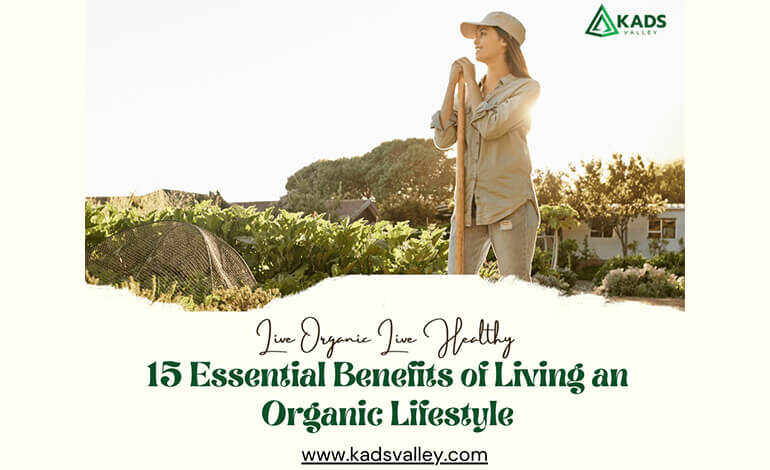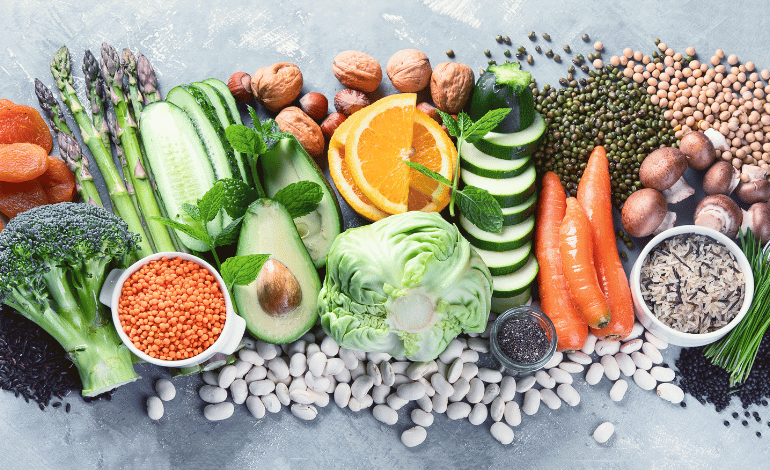15 Essential Benefits of Living an Organic Lifestyle

15 Essential Benefits of Living an Organic Lifestyle: Organic living is a lifestyle that prioritizes the use of natural and sustainable products and practices in all aspects of daily life, including food, clothing, personal care, and household items. The goal of organic living is to minimize exposure to harmful chemicals and promote a healthier, more sustainable way of living.
In terms of food, organic living involves choosing organic produce, meat, and dairy products that are grown or raised without synthetic pesticides, herbicides, and fertilizers, and without the use of antibiotics and growth hormones. Organic farmers use natural methods such as crop rotation, composting, and the use of beneficial insects to manage pests and maintain soil fertility.
In addition to food choices, organic living involves selecting natural and eco-friendly household and personal care products that are free from harmful chemicals and toxins. This includes choosing products made from organic and sustainable materials, such as cotton, bamboo, and hemp, and using non-toxic cleaning supplies and personal care products.
Organic living also encourages sustainability practices such as reducing waste, conserving water and energy, and supporting local and organic agriculture. This can include actions such as composting, recycling, reducing the use of single-use plastics, and purchasing from local farmers and businesses.
Overall, organic living is a holistic approach to living that prioritizes health, sustainability, and environmental stewardship. It is a lifestyle that promotes a healthier, more natural way of living while also working to protect and preserve the planet for future generations.
15 Essential Benefits of Living an Organic Lifestyle
1. Reduced Exposure to Harmful Chemicals
Organic living means reducing exposure to harmful chemicals such as pesticides, herbicides, and synthetic fertilizers, which can be toxic to humans and the environment.
Reduced exposure to harmful chemicals is a major benefit of living an organic lifestyle. Synthetic pesticides, herbicides, and fertilizers used in conventional farming practices can have negative impacts on human health and the environment. Organic farming practices use natural methods to control pests and weeds, which reduces the need for synthetic chemicals and, therefore, the potential exposure to harmful toxins. Organic foods are also free from synthetic pesticides and fertilizers, preservatives, and artificial colors and flavors, which means they are less likely to contain potentially harmful chemicals. By choosing organic products and supporting organic farming practices, individuals can help protect their health and the environment.
2. Better Health:
Organic food is grown without the use of synthetic pesticides and fertilizers, which may contain harmful chemicals that can impact human health. Eating organic food may help reduce the risk of chronic diseases.
Eating organic food has been linked to better health outcomes due to the lack of synthetic pesticides, herbicides, and fertilizers in their production. Studies have suggested that organic food may reduce the risk of chronic diseases such as cancer, heart disease, and type 2 diabetes, and may even boost the immune system. Organic food is also often richer in nutrients such as vitamins and minerals due to the use of natural fertilizers and farming methods. By choosing organic food, individuals may improve their overall health and reduce the risk of chronic illnesses associated with exposure to synthetic chemicals.
3. Higher Nutrient Content:
Organic food is often richer in nutrients such as vitamins and minerals due to the use of natural fertilizers and farming methods.
Organic foods are often found to have higher nutrient content compared to their conventionally grown counterparts. This is because organic farming practices focus on building soil health and fertility, which translates to higher levels of nutrients in crops. Organic farmers use natural methods such as crop rotation, cover cropping, and composting, which help to enrich the soil with nutrients. Organic crops are also grown without the use of synthetic fertilizers, which can lead to imbalanced nutrient levels. Studies have shown that organic fruits and vegetables can have higher levels of vitamin C, antioxidants, and other important nutrients. By choosing organic foods, individuals can increase their nutrient intake and support a healthier diet.
4. Improved Soil Health:
Organic farming practices help improve soil health by promoting biodiversity, increasing soil fertility, and reducing erosion.
Improved soil health is another important benefit of organic living. Organic farming practices focus on building soil health through natural methods such as crop rotation, cover cropping, and the use of organic matter like compost and manure. These practices help to maintain soil fertility, promote healthy soil microorganisms, and prevent soil erosion. Organic farming also avoids the use of synthetic pesticides and fertilizers, which can harm soil health and reduce biodiversity. By improving soil health, organic farming can support a healthier environment and produce healthier crops with better nutrient content. Additionally, healthy soil can also help to sequester carbon from the atmosphere, making organic farming a potential solution to climate change.
5. Reduced Environmental Impact:
Organic farming practices reduce the use of synthetic chemicals, which can have negative impacts on the environment, including water pollution and harm to wildlife.
One of the primary benefits of organic living is its reduced environmental impact. Organic farming practices prioritize the use of natural methods to control pests and maintain soil health, which reduces the need for synthetic chemicals that can harm the environment. Additionally, organic farming practices typically use less energy and water than conventional farming practices, which can reduce greenhouse gas emissions and water pollution. Organic farming also supports biodiversity by promoting the growth of native plants and reducing the use of monoculture farming practices. By choosing organic products and supporting organic farming practices, individuals can help to reduce their environmental impact and support a more sustainable future for the planet.
6. Support for Local Economies:
Buying organic food from local farmers helps support local economies and reduces transportation emissions associated with long-distance food transport.
Organic living can also support local economies by promoting the growth of small-scale, local organic farming operations. By choosing to purchase organic products from local farmers, consumers can help to support their local economies and strengthen their communities. Local organic farming operations often use sustainable methods that are better for the environment and produce healthier, more nutritious crops. By supporting local farmers, consumers can also reduce the environmental impact of their food choices by reducing transportation emissions and promoting local biodiversity. Additionally, buying from local farmers can help to build relationships between consumers and producers, which can promote transparency and accountability in the food system.
7. Reduction in greenhouse gas emissions:
Organic farming practices reduce the use of fossil fuels associated with synthetic fertilizers and pesticides, reducing greenhouse gas emissions.
Organic living can also contribute to a reduction in greenhouse gas emissions, which is critical in mitigating climate change. Organic farming practices tend to use less energy and rely on natural inputs such as compost, crop rotation, and cover cropping. In contrast, conventional farming practices often rely on synthetic fertilizers and pesticides that require large amounts of energy to produce and distribute. By avoiding these energy-intensive inputs, organic farming can reduce greenhouse gas emissions and minimize the impact of farming on the environment. Additionally, organic farming practices often prioritize biodiversity and healthy soil, which can help to sequester carbon from the atmosphere and further reduce the impact of farming on the climate.
8. Better Taste:
Organic food is often fresher and more flavorful because it is grown in a natural environment and is free from synthetic chemicals.
Another benefit of organic living is the potential for better taste in food. Organic farming practices often prioritize soil health and fertility, which can lead to healthier, more flavorful crops. In contrast, conventional farming practices that rely heavily on synthetic fertilizers and pesticides may produce crops that are less flavorful and have a more uniform appearance. Additionally, organic farmers often use traditional and heirloom seed varieties that have been developed for their taste and quality, rather than for their ability to withstand long transportation and storage times. By choosing organic foods, individuals may be able to enjoy fresher, more flavorful produce that is free from synthetic additives and chemicals.
9. Increased Biodiversity:
Organic farming practices promote biodiversity by encouraging the growth of a variety of crops, reducing monoculture farming, and providing habitat for wildlife.
Organic living can also promote increased biodiversity, which is crucial for maintaining healthy ecosystems. Organic farming practices prioritize the use of natural methods to control pests and promote soil health, which can support a wider range of plant and animal species. By avoiding the use of synthetic pesticides and fertilizers, organic farmers create a safer environment for beneficial insects and pollinators such as bees and butterflies. Additionally, organic farmers often use crop rotation and intercropping to create diverse habitats that can support a range of plant species. By supporting organic farming practices, individuals can help to promote biodiversity and protect the natural ecosystems that are essential for human well-being.
10. Supporting Ethical Farming Practices:
Organic farming methods prioritize ethical practices, such as animal welfare and fair labor practices.
Organic living also supports ethical farming practices that prioritize the well-being of animals and workers. Organic farming standards typically require that animals be given access to the outdoors, fresh air, and clean water, and that they are raised without the use of antibiotics or hormones. Organic farming practices also prioritize fair labor practices, including fair wages and safe working conditions. By choosing organic products, individuals can support these ethical farming practices and promote a more humane and sustainable food system. Additionally, many organic farmers are small-scale, family-owned operations that rely on the support of their local communities. By supporting these farmers, individuals can help to build a more resilient and sustainable food system.
11. Reduced Risk of Antibiotic Resistance:
Organic meat and dairy products come from animals that are not routinely given antibiotics, reducing the risk of antibiotic resistance.
Organic living can also reduce the risk of antibiotic resistance, a major public health concern. Organic farming practices prohibit the use of antibiotics in animal feed, which can reduce the risk of antibiotic-resistant bacteria developing in animals and spreading to humans. In conventional farming, antibiotics are often used to promote growth and prevent illness in animals, leading to the development of antibiotic-resistant strains of bacteria that can spread to humans. By choosing organic animal products, individuals can help to reduce their exposure to antibiotic-resistant bacteria and support a more responsible approach to animal health. This can help to protect public health and reduce the risk of antibiotic-resistant infections in humans.
12. Improved Water Quality:
Organic farming practices reduce water pollution from synthetic fertilizers and pesticides.
Organic living can also contribute to improved water quality by reducing the use of synthetic fertilizers and pesticides that can contaminate waterways. Organic farming practices typically rely on natural methods such as crop rotation, cover cropping, and composting to maintain soil fertility and control pests, which can reduce the need for synthetic inputs that can leach into nearby water sources. Additionally, organic farming practices prioritize the conservation of water resources and often use less water than conventional farming practices. By choosing organic products and supporting organic farming practices, individuals can help to protect water quality and promote sustainable water management practices.
13. Protection of Wildlife:
Organic farming practices reduce the use of harmful chemicals that can harm wildlife and their habitats.
Organic living can also help protect wildlife by reducing the impact of farming on natural habitats. Organic farming practices prioritize the use of natural methods to control pests and promote soil health, which can support a wider range of plant and animal species. By avoiding the use of synthetic pesticides and fertilizers, organic farmers create a safer environment for beneficial insects and pollinators such as bees and butterflies, which are essential to the health of many ecosystems. Additionally, organic farmers often use crop rotation and intercropping to create diverse habitats that can support a range of wildlife species. By choosing organic products and supporting organic farming practices, individuals can help to protect wildlife and promote biodiversity.
14. Reduced Waste:
Organic farming practices often incorporate techniques such as composting and crop rotation, reducing waste and improving soil health.
Organic living can also help to reduce waste by promoting sustainable farming practices that prioritize the efficient use of resources. Organic farming often relies on practices such as composting, cover cropping, and crop rotation to maintain soil fertility and reduce the need for synthetic fertilizers and pesticides. This can help to reduce the amount of waste produced by farming operations and reduce the need for synthetic inputs that can be harmful to the environment. Additionally, many organic farmers prioritize the use of renewable energy sources such as solar and wind power, which can further reduce waste and promote sustainable resource use. By choosing organic products, individuals can help to promote more sustainable farming practices and reduce waste in the food system.
15. A sense of Community:
Living an organic lifestyle often involves connecting with local farmers and like-minded individuals who share a passion for sustainable living.
Organic living can also promote a sense of community by connecting individuals with local farmers and food producers. Many organic farmers rely on direct-to-consumer sales channels such as farmers markets, CSAs (Community Supported Agriculture), and farm stands to sell their products. By purchasing organic products from these sources, individuals can develop relationships with local farmers and learn about the challenges and rewards of sustainable agriculture. Additionally, many organic farms offer educational programs and volunteer opportunities that allow individuals to get involved in the farming community and contribute to the local food system. By supporting local organic farmers and food producers, individuals can help to build stronger, more resilient communities.
Bottom line
Organic living offers a wide range of benefits for individuals, communities, and the environment. By choosing organic products and supporting organic farming practices, individuals can reduce their exposure to harmful chemicals, promote better health, and support sustainable food systems that prioritize soil health, biodiversity, and ethical farming practices. Organic living can also help to reduce waste, protect wildlife, and promote a sense of community by connecting individuals with local farmers and food producers. Overall, organic living offers a holistic approach to food production and consumption that prioritizes the health of people, animals, and the planet. By embracing organic living, individuals can contribute to a more sustainable and just food system that promotes the well-being of all.








